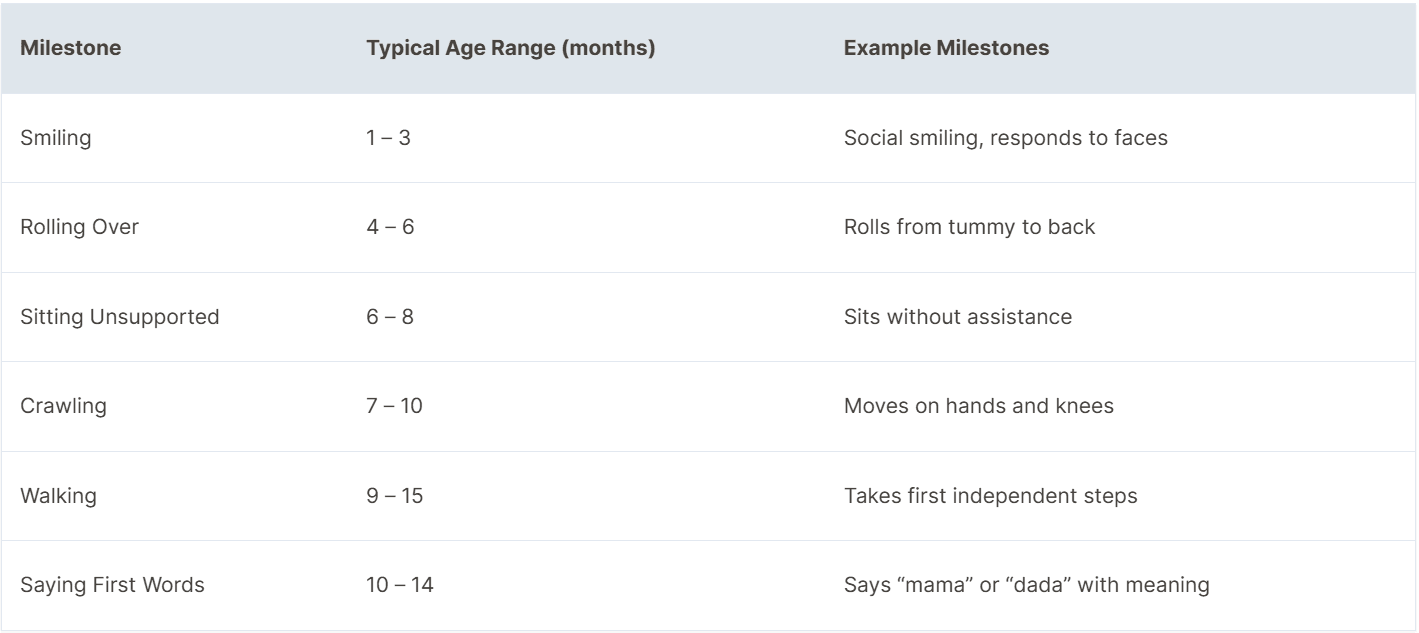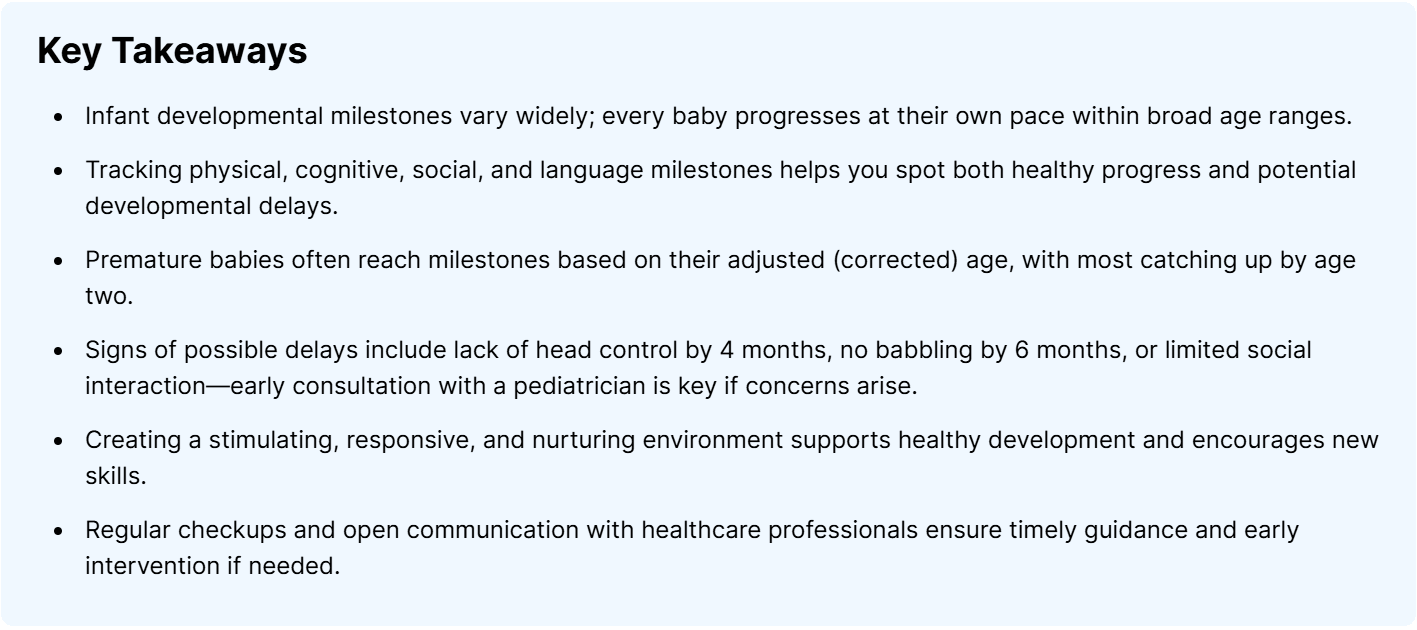Watching your baby grow is both exciting and a little nerve-wracking. Every coo giggle and tiny movement feels like a milestone, and for good reason. During the first year babies experience rapid changes in physical motor and social development. Most newborns start by moving their heads from side to side and gradually progress to holding their heads up and tracking movement with their eyes.
It's important to remember that every child develops at their own pace. Some babies may reach certain milestones earlier or later than others and that's often perfectly normal. Understanding what to expect at each stage can help you recognize healthy progress and spot any signs that might need extra attention. By staying informed you’ll feel more confident supporting your little one’s growth and knowing when to seek guidance if something doesn’t seem quite right.
Understanding Infant Developmental Milestones
Understanding infant developmental milestones helps you track your baby's growth and identify areas that might need attention. Development covers a range of skills, from movement to communication to problem-solving.
What Are Developmental Milestones?
Developmental milestones are key skills or behaviors your baby develops within certain age ranges. Examples include cooing, sitting, crawling, and smiling in response to your voice. These checkpoints show progress in your baby's growth, with each milestone marking a new achievement. Not every baby reaches milestones at the same time, so small variations are common.
Types of Milestones: Physical, Cognitive, Social, and Language
Milestones fall into four main categories, each representing an essential area of your baby's development:
- Physical milestones involve gross motor skills like rolling over, sitting, or standing, and fine motor skills like picking up small objects or bringing hands to the mouth.
- Cognitive milestones include actions like recognizing familiar faces, following objects with their eyes, or exploring the environment by reaching for toys.
- Social milestones track how your baby interacts, such as making eye contact, responding to your voice, or showing different emotions.
- Language milestones cover making sounds, babbling, turning toward familiar voices, and responding to simple words.
These categories help you and your pediatrician monitor different aspects of your baby's development and address areas where support might be needed. Regular well-child visits and ongoing observation support timely identification of any delays.
Month-by-Month Milestone Guide
Babies develop significant new abilities each month, especially in their first year. Tracking these infant milestones helps you understand what's typical and notice your child's unique pace.
Newborn to 3 Months
Early months bring rapid changes in movement, interaction, and perception.
- Gross motor development: Moves head from side to side when on stomach, holds head up briefly by 2 months, shows jerky arm movements.
- Fine motor development: Keeps hands in tight fists, strong grip, brings hands within view, opens and closes hands.
- Language and cognitive milestones: Stares at hands and faces, tracks movement with eyes, recognizes familiar voices, starts cooing, imitates simple facial gestures by 3 months.
- Social development: Smiles by about 2 months, enjoys looking at faces, turns toward familiar sounds.
4 to 6 Months
Babies gain better control of their bodies and become more social.
- Gross motor progress: Pushes up on arms during tummy time, rolls from back to side or stomach, begins to sit with little support.
- Fine motor progress: Grasps objects, transfers them between hands, explores objects with mouth, starts to reach and swipe.
- Language and cognitive skills: Laughs out loud, babbles, responds to sound, imitates sounds or expressions.
- Social signals: Enjoys play, may cry when play stops, distinguishes familiar caregivers, shows interest in other children.
7 to 9 Months
During this stage, infants increase mobility and explore their environment.
- Gross motor advancement: Sits without support, starts crawling, may pull to stand.
- Fine motor advancement: Picks up objects using thumb and finger, bangs objects together, explores with hands and mouth.
- Language and cognitive advances: Babbles with diverse sounds, understands simple words, responds to their own name, looks for hidden objects.
- Social-emotional growth: Expresses a range of emotions, shows preference for familiar people, plays simple social games like peek-a-boo.
10 to 12 Months
End of the first year brings greater independence and first words.
- Gross motor skills: Cruises along furniture, may stand or walk alone for a few steps, squats to pick things up.
- Fine motor skills: Points, pokes, and manipulates small objects, uses thumb and index finger in pincer grip.
- Language and cognitive functions: Says simple words like “mama” or “dada,” imitates speech sounds, follows simple directions.
- Social and interactive behaviors: Shows attachment, plays interactive games, imitates gestures, waves goodbye, enjoys being the center of attention.
Tracking these month-by-month milestones gives you a clear view of your infant’s growth in gross motor, fine motor, language, cognitive, and social development.
What’s Normal: Variation in Infant Development
Every baby follows a unique timeline and experiences development in different ways. Small differences in when your baby sits, crawls, or talks often fall within normal ranges.
When to Expect Each Milestone
Babies typically reach developmental milestones—such as rolling, sitting, or babbling—at their own pace, within broad age ranges. For example, some babies sit as early as 4 months, while others wait until 6 or 7 months. Language skills like cooing or saying first words may emerge over several months rather than at a fixed age. Skills in social interaction and movement also progress on their own schedules. If your baby advances in one area sooner, slower progress in others remains common and doesn’t often signal a problem.

How Prematurity Can Affect Milestones
Premature birth shifts the age when milestones typically occur. Babies born before 37 weeks usually achieve skills by their adjusted age—a calculation based on due date, not birth date. For instance, if your baby arrives 8 weeks early, expect milestones to align with babies 8 weeks younger. By age 2, most premature infants catch up to peers in growth and development. Early evaluation and tracking help ensure prompt support for preterm babies, with pediatricians monitoring progress at each visit.
Signs of Developmental Delays
Recognizing signs of developmental delays helps you respond early to any concerns about your baby’s growth. Early action in the first months and years often leads to significant improvements in your child’s physical, cognitive, and social development.
When to Be Concerned
Monitor your baby for persistent gaps in key developmental milestones. Signs of delay include:
- Physical Milestones: Difficulty holding their head steady by 3–4 months, not rolling over or sitting up by the expected ages, or slow progress in grasping objects all suggest delayed gross or fine motor skills. For example, most infants hold their head up by 3 months and roll over by 6 months.
- Language Skills: Lack of babbling or no response to sounds by 6 months, or no first words by 12 months, can indicate a delay in communication ability.
- Social and Emotional Development: Limited smiling, little eye contact, or minimal interest in caregiver interaction by 6 months may point to social or emotional concerns.
- Seek guidance from a pediatrician if you notice these signs. Subtle differences in timing are common, yet consistent absence of new skills in several domains often warrants early intervention.
How to Support Your Baby’s Development
Provide purposeful support to encourage progress in infant milestones:
- Engage Regularly: Interact with your baby daily through eye contact, talking, singing, and playing with toys that stimulate movement and curiosity.
- Create a Stimulating Environment: Offer age-appropriate activities like tummy time, textured toys, and objects to reach or grasp. These promote motor and cognitive growth.
- Establish a Routine: Consistent schedules with regular well-child visits help ensure your baby stays on track for developmental milestone achievement.
- Partner With Professionals: Build a relationship with a trusted pediatrician for ongoing evaluations, advice, and access to early intervention services if needed. Early specialist referrals increase the likelihood of overcoming minor or major delays.
Optimizing your baby’s environment and monitoring their progress builds a strong foundation for healthy overall development.
Tips for Encouraging Healthy Development
Create a responsive environment
Responsive environments promote infant and toddler milestone achievement. React consistently to your baby's cries, coos, and body language. Provide comforting touch and eye contact during daily routines.
Prioritize proper nutrition
Nutrition supports physical and brain growth for infants and toddlers. Breast milk or infant formula meets the nutritional needs for most babies up to 12 months. Introduce age-appropriate solid foods between 4 and 6 months as recommended by your child's pediatrician.
Provide age-appropriate stimulation
Age-appropriate stimulation encourages motor and cognitive growth. Offer safe objects to grasp, colorful toys to explore, and tummy time for building strength. Rotate activities to keep your baby engaged and interested.
Ensure stimulating physical environments
Stimulating environments foster both fine and gross motor skill development. Give your baby floor time for rolling, crawling, and reaching. Arrange objects to prompt movement and exploration.
Establish predictable routines
Predictable routines help infants and toddlers build emotional security. Maintain regular sleep, feeding, and play schedules, adapting as your child grows. Use consistent transitions for activities.
Support social and language engagement
Social and language-rich settings promote communication and emotional connection. Talk to your baby about what you’re doing, narrate routines, and sing simple songs. Encourage face-to-face interactions and respond to your baby's vocalizations.
Monitor development during regular checkups
Routine pediatric visits track your baby's physical and motor milestone timeline. Share observations about your baby’s development with healthcare professionals and discuss any concerns early.
Adapt to individual growth rates
Individual growth patterns differ for each child. Celebrate new skills, compare progress only to typical milestone ranges, and avoid stressing over minor timing differences. Consult your child’s doctor if notable delays persist or you have specific concerns.

Conclusion
Trust your instincts as you watch your baby grow and change each day. Staying informed about infant milestones helps you recognize your child’s unique journey and spot any early signs that may need attention.
Remember that every baby develops at their own pace. If you ever have concerns or questions about your child’s progress don’t hesitate to reach out to your pediatrician. Your support and involvement play a key role in nurturing your baby's healthy development.


